#for teachers
Explore tagged Tumblr posts
Video
ITALIAN COFFEE MAKERS. #coffeemaker #technology #homeappliance
#youtube#COFFEE#COFFEE MAKERS#ITALIAN COFFEE MAKER#COFFEE LOVERS#technology#TEACHERS#TEACHERS COFFEE LOVERS#FOR TEACHERS
2 notes
·
View notes
Photo
[ID: Screenshot of a tumblr post.
Within the tumblr post is a screenshot of a tweet by Abbie (@AbbieEvansXO) that reads:
[Old west saloon owner]: make it so the floorboards don't creak when regular patrons walk in but do creak when a mysterious stranger walks in Carpenter:…what
Reblog by @/roboticsappreciationsociety that reads: What if you intentionally put in one squeaky floorboard and tell your regulars that if they squeak it, their first drink costs 10% extra, then only new people who don't know the rule will step on it and familiars will avoid it.
Reblog by @/onlymollygibson:
Did… did you just write an algorithm for human behavior? Because that is exactly what I would expect from a robot appreciation Tumblr.
/ End of ID.]
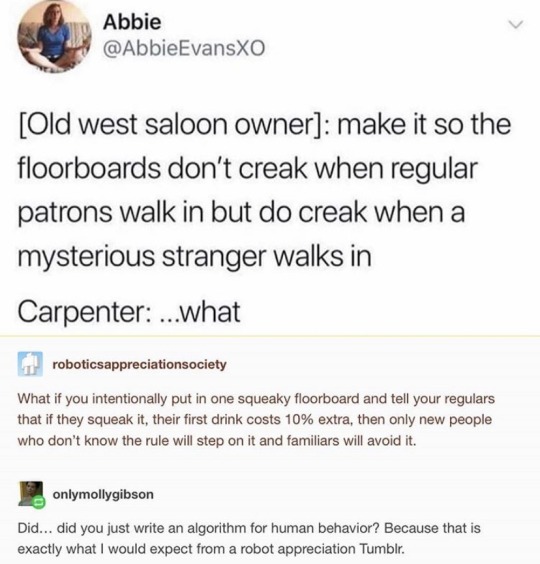
#Text#Image#Image Described#Against the bore#For the bored#Fun one#Reference#For writers#For artists#For creators#Creating#Art#Writing insp#People being people#History#Culture#Architecture#Design#Fun to know (science side)#Fun to know (humanities side)#For teachers#Education
275K notes
·
View notes
Text
the thing is that childhood doesn't just end when you turn 18 or when you turn 21. it's going to end dozens of times over. your childhood pet will die. actors you loved in movies you watched as a kid will die. your grandparents will die, and then your parents will die. it's going to end dozens and dozens of times and all you can do is let it. all you can do is stand in the middle of the grocery store and stare at freezers full of microwave pizza because you've suddenly been seized by the memory of what it felt like to have a pizza party on the last day of school before summer break. which is another ending in and of itself
#lucinda.txt#when i was 20 my theater teacher died and i thought i was also going to die#when i was 23 my childhood cat died and it was awful#all my grandparents are dead. liam payne from one direction has died.#it's like... okay. and you still have to wake up and go to work!#& i guess the idea is one day you'll get better at losing things#one day you just won't CARE that your childhood is over#i guess. but i doubt it.#1k#2k#5k#10k
69K notes
·
View notes
Text
the problem with reading and writing leading to a strong vocabulary is that you tend to know the vibe of words instead of their meanings.
if I used this word in a sentence, would it make sense? absolutely. if you asked me what it meant, could I tell you? absolutely not.
#someone send this to my english teacher because vocab tests are hard#writing memes#reading#writers#writers of tumblr#writers of instagram#writing#writer#reader#writer memes#readers of tumblr
171K notes
·
View notes
Text
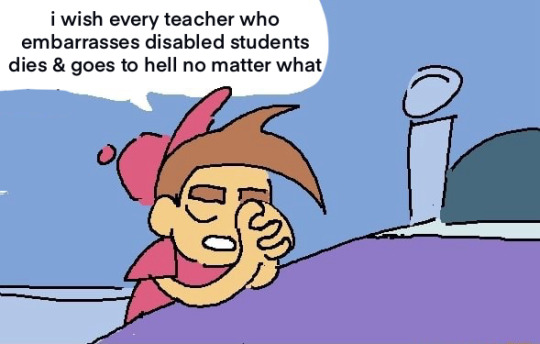
#disability#ableism#disabled#meme#had a teacher who would always make this autistic girl feel stupid whenever she asked questions and would respond loud enough for the class#to hear the annoyance in her voice#catch on fire <3#greatest hits#10k#15k#20k#30k
66K notes
·
View notes
Text
My physics teacher and I were partners in investigating an international drug smuggling operation.
18K notes
·
View notes
Text



#the constitution of the united states#the constitution#blue sky#mom was a history teacher#i am a history nerd#thats one of her 3 copies of the constitution#us current events#april 2025#izzy writes#id in alt text
8K notes
·
View notes
Text

0 notes
Text
Empower the next generation with social-emotional skills and anti-bullying strategies! 🌟 This free online course is packed with tips to help pupils identify and avoid bullying triggers, embrace positive values, and foster healthy social interactions. 🛡️💬 Learn about behavior management, the ABC’s of behavior, and how teamwork between TAs and teachers can create a supportive environment for all. 📚✨
Take the first step toward building a kinder, stronger community—enroll now! 💻🤝
#teachingtips#empowerpupils#empowerment#socialemotionalskills#antibullyingstrategies#antibullying#bullyingtriggers#embracepositivevalues#healthysocialinteractions#behaviourmanagement#teamwork#supportiveenvironment#takecareofyourchildren#betterparenting#freecourse#enroll now#takethatstep#stronger community#kinder community#do it for your children#be a better parent#be a better teacher#for parents#for teachers
0 notes
Text




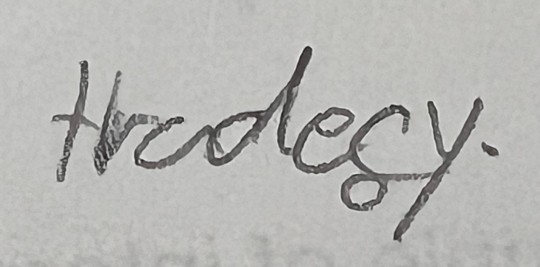
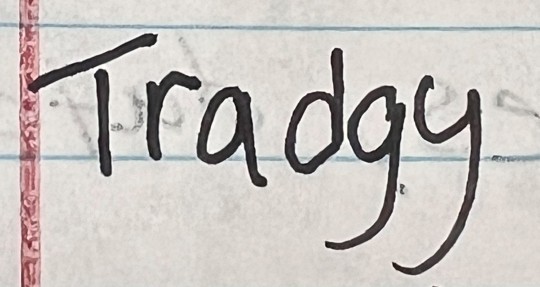
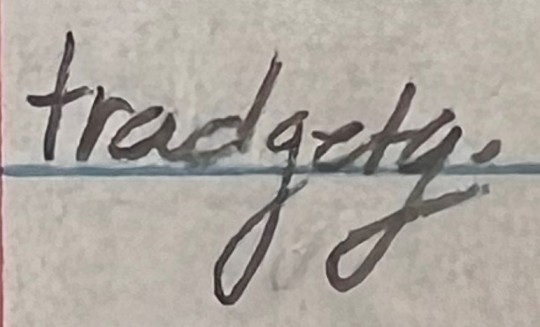
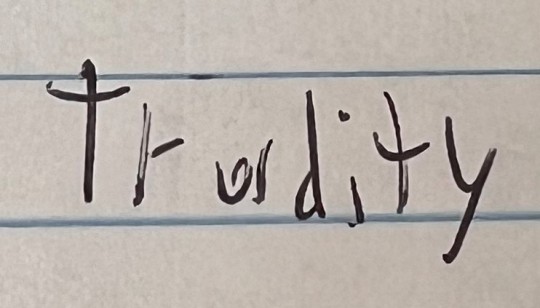

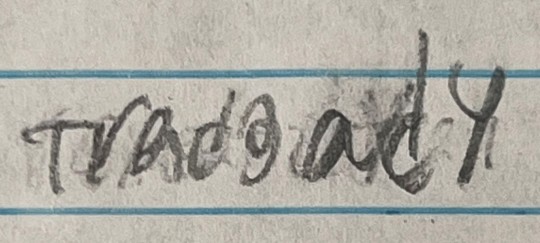





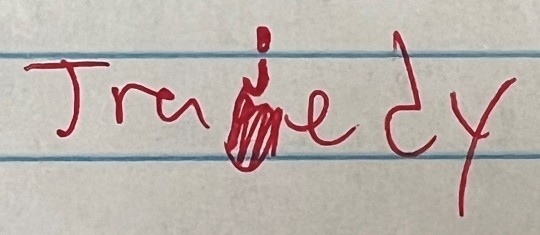




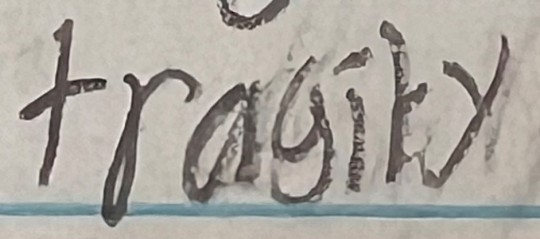
Another year, another group of my delightful ninth graders trying to spell the word "tragedy" for their Romeo and Juliet assignment.
Last year's collection
#i started questioning how to spell it myself#but again... at least they knew the right answer#i love them endlessly#teacherblr#teacher life#teaching#english class#english teacher#grammar#literature#romeo and juliet#shakespeare#william shakespeare#language#tragedy
64K notes
·
View notes
Text
"i'm too old for you" sir, the age gap is literally one of the things that got me attracted to you in the first place
#age g4p#age g@p#age difference#male teacher#hot teacher#teacher crush#teachers pet#teacher attachment#older men are hot#i like older men#older is better#oldermen#older guys#older man younger woman#gray fox#i’m just a girl
14K notes
·
View notes
Text
i just saw a post that was like "i would cannibalize gods rotting corpse" and i can see and empathize with how you might write a poem on this website but truth be told if i saw gods rotting corpse i would go eww ewwwwwww ewwwwwww ew ew ew ew ew and honestly as an ex catholic i have seen it a lot and eaten it a lot and it was kinda nastyy in a bad way. i once got a lecture at school for chewing it with my mouth open.
8K notes
·
View notes
Text
“that’s right, princess. fight back. make it difficult… give me a reason to get rough.”
#lucifer#my post#corruption kink#daddy k!nk#daddy's good girl#free use slvt#forced intox#bd/sm daddy#bd/sm kink#cnc free use#cnc k!nk#free use kink#rap3 fantasy#r@pe kink#rough cnc#bd/sm community#teacher crush#bd/sm blog#bdsmkink#goth#gun k!nk#somno k!nk#somno breeding
10K notes
·
View notes
Text

- James Baldwin talking about Love
#love#perspective#james baldwin#path#discernment#art#synchronicity#meaning of life#sacred space#growth#teacher
20K notes
·
View notes
Text



#mha#bkdk#bakudeku#bakugou katsuki#izuku midoriya#my art#bnha#bnha fanart#mha fanart#lore is that this is established relationship bkdk but like early days#izuku really should give him a key atp but hes working his way up to it#his neighbors are starting to get concerned#i drew the floorplan for his entire apartment complex just to only draw one room#teacher!izuku#PH!katsuki#he's just getting off his patrol shift#dont ask me why i put most of my effort into the top view of his desk#i made a 3d model of it in blender bc i couldnt conceptualize how the lighting would work wit h so many sources
11K notes
·
View notes